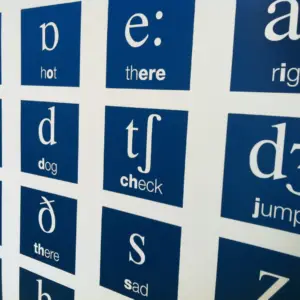Chris Pratt and the Essex Accent
Hollywood actors have a unique talent to tell a story through their character’s eyes, using body language, facial expressions, the words and the way that they say them. In some cases, Hollywood actors have to portray a character that is from another country, and for this, they have to use a different accent. Sometimes this works extremely well, and sometimes it’s an absolute fail.
We’re going to pick out one celebrity example: Chris Pratt — star of Guardians of the Galaxy, Jurassic Park and the voice of Mario (for the movie, anyway) — and look directly at his 2015 appearance on the famous English talk show, The Graham Norton Show.
First, take a look at this clip:
What is the Essex Accent?
In the interview clip above, Chris mentions the Essex accent. At around 1 minute and 30 seconds into the video, he even mimics the voice of a common Essex speaker. But where exactly is the Essex accent from?
The Essex accent is from Essex, England. Essex is a county just east of London, and is close to the capital city. It’s quite a big county, however, so when we say the “Essex accent”, there are actually varying degrees of it. This means that some people in Essex don’t speak as stereotypically “Essex” as others.
Some parts of the Essex accent go hand-in-hand with the Cockney and Estuary English accents. There are some vocal techniques which are used across all three accents, as they all come from areas quite near to each other. For example, in all of these accents, you will find:
- The “th” fronting, where the “th” sound is replaced by a “V” or the “F” sound
- The “h” is dropped
- There are also a lot of exaggerated vowel sounds, meaning some vowels extend for a little longer than expected.
Hearing the Essex Accent
Here’s a clip from The Only Way Is Essex so you can get an idea of what the Essex accent should sound like:
So what do you think? How much did you get from that conversation? Understanding the Essex accent can be quite tricky for new English learners — it does sound a little quicker than some other accents. People from Essex usually speak faster than most people, which sometimes leads to them muddying their words, almost making the words blend into one.
How Chris Pratt Learnt to Speak the Essex Accent
As we’ve seen from Chris Pratt’s Graham Norton Show impression, he’s practically mastered speaking like an Essex native. But how exactly did he learn and practise the Essex accent?
As Chris says in the interview clip: “I’m a parrot, a little bit. And so, when I was hearing [the Essex accent] all the time, I just started picking it up, like, I could pick up their accent and do their accent a little bit.”
So, he’s parroting the accent. What does that mean? It means he’s acting like a parrot. Essentially, he’s doing shadowing: he’s listening to Essex speakers on TV and then he’s repeating after them, trying to mimic the way that they speak. This is a very effective technique for improving your pronunciation.
You can tell from the reactions of the people on the sofa that Chris Pratt has mastered speaking like he’s from Essex. Jude Law, a famous English actor, is sitting on the sofa with Chris (third from the left), and we can all see his reaction to Chris’ faux-Essex accent — he’s amazed; he’s clapping, he’s laughing, making it clear that Chris is very good at mimicking the common Essex voice.
Tips for Speaking in an Essex Accent
Now, let’s analyse some of the techniques Chris Pratt uses to transform his native American voice to a spot-on Essex accent:
Tip 1 – Longer Vowel Sounds
You can hear from his first sentence – “So, like, honestly, I like, I saw this guy” – that Chris Pratt extends the word “guy,” pronouncing it more like, “Guuuyyyyy.” The word lasts a little longer than you would normally hear, and it’s very interesting to hear the difference in vowel length, which he pinpointed whilst practicing this accent.
Tip 2 – Overusing the word “Like”
This tip isn’t exactly to do with accent. However, while Chris is speaking in his Essex voice, you’ll notice that he says the word “like” a lot. This is a common feature you’ll find when you listen to people speaking in an Essex accent. You can also hear it throughout England, and in a lot of American speakers. Overusing the word “like” isn’t specific to speaking in an Essex accent, but it, like, defines it nonetheless.
Tip 3 – Glottal Stop
Did you hear the glottal stop in Chris’s clip above? This is another classic feature of the Essex accent. For example, instead of pronouncing the word “cheat” properly, Chris drops the ‘t’ from the end of the word, pronouncing it more like “chea,” replacing the letter “t” with a glottal stop.
Tip 4 – Using the phrase “You Know”
“You know” is another common phrase you’ll hear interjected into a sentence. This phrase is habitually used to reaffirm with people that they’re listening, and to make sure they understand what’s being said. The phrases “you know,” “y’know” and “you know what I mean” are spoken quite a lot in this accent, just like the word “like.”
Tip 5 – “TH” Fronting
At the end of the clip, you can hear Chris Pratt’s use of the “TH fronting” technique as he speaks the word “mother.” Chris drops the “th” in the middle of “mother” and replaces it with a “v” sound, pronouncing it more like “muvver.” This is a staple technique in correctly mimicking an Essex accent which will make your own Essex accent sound much more natural.
Chris Pratt’s Graham Norton interview gives us a good idea of how actors learn and practise a new accent. Chris did it just for fun in this clip, but regardless, he’s obviously using a collection of pin-pointed techniques that helped him to build that accent up, meaning you can do the same! Why not practise some shadowing whilst you’re listening to people speak, just like Chris did, before “parroting” the sentences to practise your pronunciation.
Join the British Accent Newsletter
And learn more about British pronunciation, accents and culture
Lessons You May Have Missed

Chris Pratt and the Essex Accent
Chris Pratt and the Essex Accent Hollywood actors have a unique talent to tell a story through their character’s eyes, using body language, facial expressions,

What is IPA (International Phonetical Alphabet)
What is the International Phonetic Alphabet and How Can It Help with English Pronunciation? The International Phonetic Alphabet (IPA) sets the global standard for pronunciation.
How do Homophones, Homographs and Homonyms Affect Pronunciation?
What Are Homophones, Homographs and Homonyms and How Do They Affect Pronunciation? Homophones, homographs and homonyms form a vital part of English grammar. Words which

Difficult Pronunciation: Bitch vs Beach
Can You Tell the Difference Between Bitch and Beach? Many students around the world struggle with these 2 common words. Today we are here to

7 Celebrities Who Speak With Cockney Accents
7 Celebrities Who Speak With Cockney Accents As a multi-cultural capital city, London accents are as varied as its people. If you’re learning English and

Scottish TV Shows to Help English Learners Improve Their Listening Skills
Scottish TV Shows to Help Your Listening Skills Understanding regional British accents isn’t always easy. With so many diverse pronunciations and localised phrases, even some
